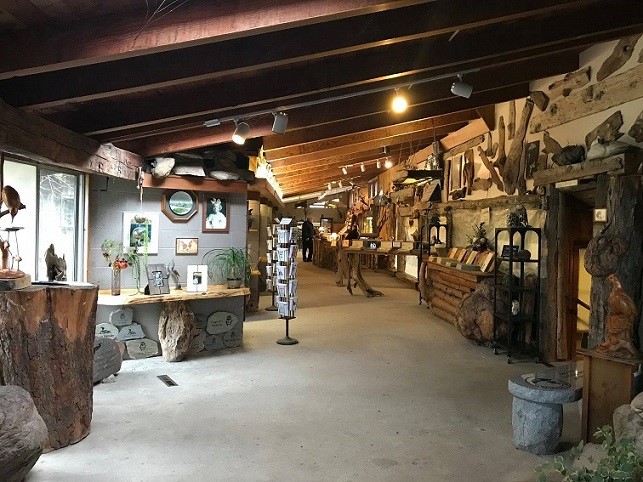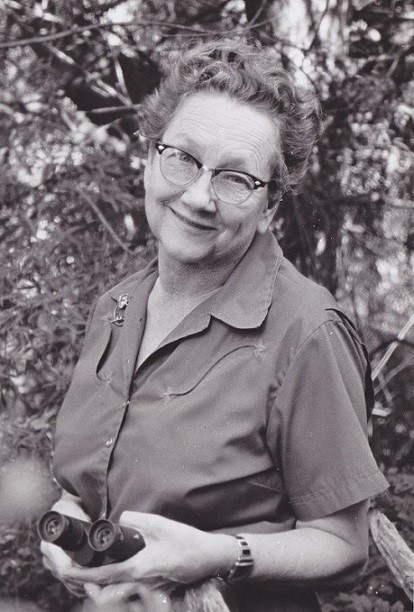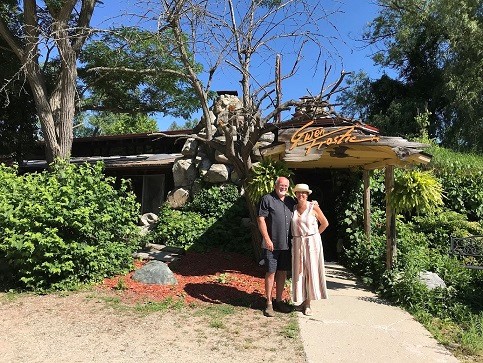
Artist Gwen Frostic’s Northern Michigan studio listed in the National Register of Historic Places
Wednesday, April 14, 2021
Designation will help ensure the Benzie County property’s preservation, continue Gwen Frostic’s legacy

LANSING, MICH. – Property that served as the studio, retail shop, printing operation, and private residence of renowned Michigan artist Gwen Frostic has been given special recognition through its listing in the National Register of Historic Places, the Michigan Economic Development Corporation has announced. Administered in Michigan by the State Historic Preservation Office, the National Register of Historic Places is the United States federal government's official list of districts, sites, buildings, structures, and objects deemed worthy of preservation for their historical significance.
“Although she was a physically disabled artist and businesswoman functioning in a man’s world, Gwen Frostic defied the odds and became a much-honored, beloved Michigander. She was an inspiration to both physically challenged persons and the women of Michigan and far beyond, as a noted artist, writer, nature lover, and entrepreneur,” said Debra Ball Johnson, AIA, architect, historic architect, and architectural historian at SHPO. “Designed by her and reflective of her love of nature, the studio represents Gwen Frostic during her productive life and most directly reflects her significance in and contributions to art in Michigan. With the help of this designation, the Gwen Frostic Studio will continue to be a destination – and inspiration – for art lovers, history buffs, and tourists for years to come.”
Located in rural Benzie County, southeast of Frankfort in Benzonia Township, Gwen Frostic’s studio building is multi-functional, containing all aspects of her professional and personal life. It opened in 1964 and housed her business Presscraft Papers, including the printing press operation and retail store, as well as her personal office and residence.
Expressive of her love of nature, it is constructed in an organic style of architecture, wedged into the hillside and utilizing natural materials from the site with long, low-pitched roofs to blend into the natural environment.
With large expanses of windows for natural light to allow for views of the bucolic landscape around the building, it includes walls and buttresses of local boulders, sod roofs, a “roundhouse” addition to accommodate increased summertime visitors and sales, and natural materials used on the interior and exterior. The original 40-acre site, which included her beloved Frog Pond, grew to more than 200 acres as Frostic acquired and preserved adjacent fields and wetlands.
The studio building is significant for the art she created while living there with nature; the books she wrote, illustrated, and printed based on her love of Michigan’s natural environment; her unique store which has hosted millions of visitors; the printing operation over which she had total control; and her actions to conserve and promote Michigan’s natural environment.

Upon her death in 2001, she donated $13 million to Western Michigan University – at the time, the largest single gift in the school’s history. The university used the funds to support art facilities and a broad array of funds and scholarships, including establishing the Gwen Frostic School of Art.
Following her passing, the property was divided into three parcels, and in 2010, local residents and husband-and-wife team Greg and Kim Forshee purchased the printing operation and 10 acres of property. The printing operation, and Gwen Frostic’s legacy, have remained flourishing to this day.

“We’re over the moon excited that Gwen Frostic Studio has been named to the National Register of Historic Places. We consider ourselves caretakers of the property, and our mission is to continue to spread the word about Gwen Frostic and to share what she accomplished in her time in Northern Michigan. This opportunity is a step in the right direction for teaching current and future generations to stick to their passions, no matter the hurdles,” said Gwen Frostic Prints co-owner Kim Forshee. “Thank you to the Michigan State Historic Preservation Office for not only nominating but working diligently on this effort to ensure that the legacy of Gwen Frostic lives on nationally.”
More than 95,000 properties across the country, including nearly 2,000 in Michigan, have been listed in the National Register since the program began in the 1960s. The National Register is a program of the National Park Service and administered by the states.
To be considered for listing in the National Register, a property must generally be at least 50 years old, and must also be significant when evaluated in relationship to major historical events or trends in the history of their community, the state, or the nation. A property must also possess historic integrity – the ability to convey its significance.
Listing of a property in the National Register is honorary and places no restrictions on what a property owner may do. They are not required to open the site to the public nor to display a plaque acknowledging the listing, although many companies offer plaques to recognize the hard work and effort to get a property officially listed. In addition, listing in the National Register provides opportunities for promotion, makes available certain incentives like grants and tax credits that foster investment in our cities, towns, and villages, and allows for the consideration of historic resources when federal funding or permits are involved.
For more information about the National Register of Historic Places program in Michigan, and how to nominate a property, visit https://www.miplace.org/historic-preservation/programs-and-services/national-register-of-historic-places/
For more information or a copy of any of these or other National Register nominations, please contact SHPO at preservation@michigan.gov.
The Gwen Frostic Studio is currently closed but will reopen for the summer on May 21, 2021. For more information, call the studio directly at 231-882-5505.
About the State Historic Preservation Office
Focused on the historic preservation of culturally or archaeologically significant sites throughout the state, Michigan's State Historic Preservation Office’s main function is to provide technical assistance to local communities in their efforts to identify, evaluate, designate, interpret and protect Michigan’s historic above- and below-ground resources. SHPO also administers an incentives program that includes federal tax credits and pass-through grants available to certified local governments.
About Michigan Economic Development Corporation (MEDC)
The Michigan Economic Development Corporation is the state’s marketing arm and lead advocate for business development, job awareness and community development with the focus on growing Michigan’s economy. For more information on the MEDC and our initiatives, visit www.MichiganBusiness.org. For Pure Michigan® tourism information, your trip begins at www.michigan.org. Join the conversation on: Facebook Instagram LinkedIn, and Twitter.
Recent Press Releases